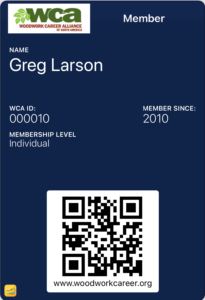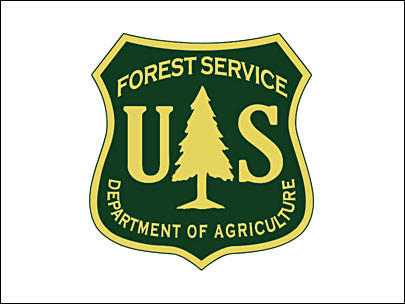
WCA Credentials and Certificates are earned by individuals, also known as candidates, by earning skill points and accumulating experience hours in either an education or work setting. Joining the WCA as an Individual Member is a prerequisite to becoming a candidate eligible to pursue credentialing. Originally called the Passport Membership, each candidate receives an electronic ID card for their smartphone as shown at right. In fact, participating in the WCA in any capacity, including working as a Skill Evaluator, requires first joining as an Individual Member. Student candidates must also attend a school that is a current EDUcation Member in order to participate. Employees at any wood manufacturing facility only need to join as an Individual Member to pursue a credential even if their employer is not a MANufacturing Member.
Candidate Records
Purchasing an Individual Membership online automatically creates a record for the candidate in the WCA national database, referred to as the Registry. The candidate is sent an email with their username, typically their email address, and a temporary password. This allows candidates to login at any time to see their own records, and allows Skill Evaluators to see the records of candidates they may be evaluating. A candidate’s record includes their total number of Skill Points, Experience Hours, Assessment Records showing the results of the Tool(s)/Operation(s) they were assessed on, and any Assessment Credits they may have, as well as additional biographical information. You will learn how to log into and use the Registry to enter and locate candidate records in a later lesson.
Candidates have the ability to email a transcript of their achievements to anyone they choose from the Registry at any time.
Skill Points
Candidates earn Skill Points (formerly known as Tool Stamps) by being assessed, or observed, by a Skill Evaluator on a Tool Operation that is contained in the WCA Skill Standards. The Skill Standards encompass well over 100 tools, each of which is broken down into multiple discrete Operations; for example, the Table Saw has 12 different operations, one of which is Tablesaw/Ripping. Each operation has two possible levels, called Level 1 (output oriented) and Level 2 (setup oriented) that a candidate may be assessed on. Being assessed at Level 1 earns one Skill Point, and being assessed at Level 2 earns an additional Skill Point, for a total of two. We will dig deeper into the Skill Standards in the next lesson.
Everyone in the program carries a Personal WCA Passport (Individual Membership) Card. Individuals earn WCA Credentials by accumulating Skill Points in the Passport and by time-on-job experience. Skill Points are earned by demonstrating competence on tool skills defined in the Woodwork Manufacturing Skill Standards, published by the Woodwork Career Alliance. The skill demonstrations are observed by a Skill Evaluator, an individual accredited by the WCA.
Skill Points are only awarded if a candidate passes the operation.
Assessment Credits
In order to be assessed, a candidate must first have Assessment Credits in their Registry account. For each Skill Point that a candidate earns, they are debited one Assessment Credit. Ten free Assessment Credits come with the purchase of each Individual Membership; additional credits may be purchased at the WCA online Marketplace at $5 each. Ten Assessment Credits allows a candidate to be assessed on five tool operations at Level 2, which earns ten Skill Points; enough for a Sawblade Certificate. Credits are automatically deposited in a candidates account when they are purchased online by the candidate. Assessment credits may also be transferred by a candidate, or evaluator, to another candidate’s account using the Registry. Evaluators are not able to enter results for a candidate in the Registry if the candidate does not have enough Assessment Credits to cover the earned Skill Points.
Any time a result is entered for a Tool Operation assessment in the Registry, Assessment Credits are debited according to the level being tested (i.e. Level 2 costs two credits), regardless of whether or not the assessment is passed or failed. If a candidate fails an assessment and the Skill Evaluator enters it in the registry, the credits will be debited, but no skill points awarded. More on this later…
Experience Hours
Candidates can accumulate experience hours two ways; by being a student in a qualified woodworking oriented training program or as an employee in the wood manufacturing industry. Up to 1600 hours of Educational experience may be applied, including woodworking instruction related classes such as math, and internships. Skill Evaluators are responsible for verifying the candidate’s hours and entering them in the Registry; do not enter them if you cannot verify them. If in doubt about whether a candidate’s hours qualify, check with the Chief Evaluator in your region. You will be required to give a detailed description of where and when the hours were earned. While experience hours can be earned anywhere, a student must be attending an EDU member school at the time the credential is awarded.
Credential and Certificate Levels

Click on Chart to Enlarge
The WCA offers one certificate and six credential levels, with the first Core Credential requiring 20 Skill Points and a minimum of 120 experience hours and a written test. The Sawblade Certificate was created to allow high school students who are unable to accumulate enough experience hours to earn a credential to graduate with a certification. This, and the Core Credential are the only levels that requires a written test, which students take online. Students who accumulate enough experience hours in high school, purchases additional assessment credits, and are assessed on more tools, are eligible to earn higher level credentials. Many high school programs allow students to accumulate enough hours to also earn a Core Credential, and most post-secondary programs allow students to accumulate enough hours to earn a Green credential, or possibly even Blue.
Both the Skill Points and Experience Hours are cumulative; each Credential adding to the one above. The Red, Gold, and Diamond Credentials require a practical demonstration of acquired skills, which is custom tailored and related to the candidate’s real world working situation and experience.
The Core, Green and Blue Credentials can be earned by students in a qualified training program, which may include some time in a manufacturing shop or plant. By the time a candidate applies for the Red Credential s/he is assumed to be employed in the industry. In other words, both school and work hours count for the Core, Green and Blue Credentials, but only work hours count above that.
The Core Credential was designed specifically for short term, intensive programs such as workforce training classes, or students in higher level high school woodworking classes. In face, the state of Wisconsin recently changed their rules. In the past, schools could receive compensation for each student that earned the Sawblade Certificate; the new rules require a Core Credential to qualify for compensation. Please refer to the Core Credential summary page for details on the Core Credential requirements.
Summary of Credential Progression:
- Sawblade Certificate – 10 skill points, >80% on 40 question Sawblade Quiz, and enrolled at a WCA EDUcation™ school.
- Core Credential – 20 skill points, 120 hours (education and/or work)
- Green Credential – 30 skill points, 480 hours (education and/or work)
- Blue Credential – 60 skill points, 1600 total hours (education and/or work)
- Red Credential – 120 skill points, 3200 total hours employed, skill demonstration
- Gold Credential – 180 skill points, 4800 total hours employed, skill demonstration
- Diamond Credential – 240 skill points, 6400 total hours employed, master project
Cost
As mentioned previously, the $55 Individual Membership comes with 10 free Assessment Credits, which is enough to obtain the Sawblade Certificate. The Core level requires 10 additional Skill Points, for a total of 20, which in turn requires purchasing 10 additional Assessment Credits at $5/each. Therefore, a Core Credential costs $55 for the Individual Membership plus $50 in additional Assessment Credits, for a total of $105. A Green Credential requires an additional 10 Assessment credits, for a total of $50, bringing the total cost for a Green Credential to $155; similarly a Blue Credential requires an additional 30 Assessment credits, for a total of $150, bringing the total cost for a Blue Credential to $305. Going up the ladder, the cost is determined by the number of additional assessment credits that need to be purchased.








